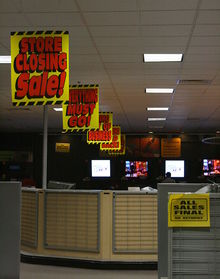- Closeout (sale)
-
"Clearance Sale" redirects here. For the Price Is Right game, see List of The Price Is Right pricing games#Clearance Sale.
A closeout or clearance is the final sale of an item or items to zero inventory. It may be a given model of item that is not selling well, or in the case of the final closure of a retailer because of a relocation, a fire (fire sale), or especially because of a bankruptcy. In the latter case, it is usually known as a going-out-of-business sale, and is part of a liquidation. A "hail sale" is a closeout at a car dealership after hail damage. Often, when the store is shutting down, they let people know that this is their last chance to buy the merchandise.
A closeout store is a retailer specializing in buying closeout items wholesale from other retailers and selling them at a discount. Big Lots is probably the most well-known closeout store chain in the U.S., but other stores such as TJ Maxx, Ross Dress For Less, Marshall's, and Value City are also common, specializing more in clothing and housewares.
Some clearance merchandise is non-returnable at some stores, as the intent is of course to get rid of the items. This is especially the case with liquidation and store-closing sales.
Rather than storing merchandise until the following year, almost every U.S. store also has post-holiday clearance sales now, sometimes starting even before the holiday (especially Christmas and Halloween). Early discounts are often around 25%, but range from zero to as much as 50%, particularly if the "regular" prices were deliberately inflated as some stores do. 50% is common just after the holiday, often followed by 75%, and sometimes even 90%, at which point there is very little if anything left to choose from. Often during after-Christmas clearance sales, they let people know that this is their chance to buy everything they didn't get for Christmas, or as the phrase goes, "everything Santa Claus forgot."
Some stores do pack-up holiday merchandise after going 50% off for a week or so, but often fail to remove the items from shelves before going back to regular price. A few merchants actually get credit back from vendors for throwing out certain merchandise.[citation needed]
Some customers take note of when specific retailers normally mark down merchandise further, showing up at the store on the very first day for the best selection. More general seasonal merchandise (such as winter clothing or summer patio furniture) is also put on clearance, but at more irregular times, making way for new fashions and fads.
Even thrift stores have "rolling" closeouts. In this case, all merchandise put out in a given week is given a colored tag, or a letter to indicate what color if the item is directly marked with a grease pencil. During the last week before the color is used again, everything marked in that color is discounted, usually by 50%. At the end of the week, all remaining item with that tag color are removed from the shelves. There are typically four colors, so that all merchandise is rotated every month or so. Some independent stores may use other similar systems, such as using more colors, and possibly marking down a color by 25% the week before it goes 50% off.
Clearance sales typically occur on clearance racks in brick-and-mortar stores. Stores typically place merchandise on a clearance rack and mark the price down until someone purchases the item. This clearance sale can be further enhanced by using banners and signs, both on the interior and exterior of the store. This process has been replicated on the internet. The defunct drop.com was the first clearance website to mimic a retail store clearance rack by allowing sellers to automatically mark down their items to a pool of consumers.
See also
Categories:
Wikimedia Foundation. 2010.

